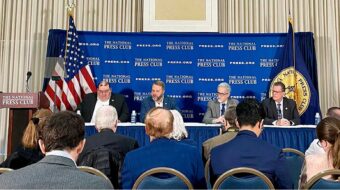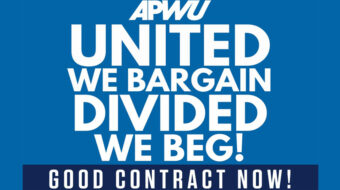It was a nice drive up here, saw all kinds of castles on the way. Almost every town has its own castle and some were real big. I dig castles. Tommy digs French girls. Bonnie digs French beer. crazy. You should hear Tommy now. He can say a few words like bye bye, thank you, eat (real plain) and sh–. (his mother taught him to say that). Whenever he hears a rock & roll record he starts to move to the tune, he’s a real kool kat. We like him. crazy.
A letter dated April 19, 1960, sent from Chinon, France back home to Royal Oak, Michigan rests delicately between my fingers. I am Tommy. That is what my immediate family has called me since birth, my middle name. For 15 months, from November of 1959 till February of 1961, I was an Army brat living in a foreign country. I can’t remember any of it. I was only three months old when we crossed the pond. So my mother painstakingly put together a scrapbook, in chronological order, of all the letters written by her and my father during his service. As I turn the yellowed pages one by one I relive the infanthood that sits somewhere deep in my psyche. The touch of the paper to my skin, the tactility, and its curious aroma are as important to my primitive senses as the words are to my intellect. In experiencing these letters, in some inextricable way, I better understand the man that I am today.
I have a friend in Kentucky that will write my wife and me two or three times a year. When the envelope is opened, this grand flourish of penmanship jumps out at us in true southern hospitality. Whenever I read Lisa Marie’s scribing, it is almost as if she is in the room with us. Even thinking about those letters right now, I can hear her charming laughter just slightly off in the distance. A close family friend wrote to me after my father passed away two years ago. It started off “This is the most difficult letter I have ever written in my life.” It went on to describe the loss she felt, the heaviness in her heart, and her condolences for my family. This letter, a simple piece of paper stained with ink and tears, carried mountains of emotions from Boston back home to Royal Oak, Michigan.
Americans say they love to receive letters through the mail, but they send less and less of it. The Postal Service calculates that almost two months pass before the average household gets a personal letter, compared with two weeks 15 years ago. Only 4% of personal mail comes from another household. Only 0.7% of the U.S. mail stream consists of personal letters, with the other 3.3% being greeting cards and postcards. With the Internet and cell phone use filling in the communications territory that once belonged to the U.S. mails, one has to ask a very big question; what is being lost?
What’s lost? Something that can be touched, something that can be saved. In our harried lives, with smartphones and Facebook and emails as our primary source of connecting with each other, the delete button erases any trace of our past communications. I have heard that children nowadays do not even learn cursive writing in school. I hope that is not true. In a sea of Tweets, texts, and emails using abbreviations, acronyms, and unskilled grammar, something is bound to be lost. And it is more than just first class mail volume.
In the past we have had reams of written correspondences to ponder for centuries of our leaders’ successes and failures. Without paper communications, historians could lack a vital research tool. What will current generations know of our current leaders? Only what they want the public to know. Also, written communication can’t be hacked or go viral and is less apt to be sent off in anger. Most of us I am sure have been involved in situations where we wished we had not hit the “enter” key before thinking out the consequences.
A young couple recently moved onto my route; in their twenties with a new baby. One day, a very curious piece of outgoing mail was waiting for me to pick up. It was a postcard with a schematic of a chessboard on the front. An opening move had been drawn on the chess board, and on the blank back of the card was a handwritten greeting to his friend. He encouraged his buddy to make the next move and keep in touch. Two weeks later I delivered a card with a return opening chess move on the front and a return message on the back. This has been going on for months back and forth and they are barely midway through their game. I caught the young man on his porch one day and asked him about the postcard chess match. He explained the game was of little significance; this was an exercise in staying in touch with his out of state comrade. Some might find that quaint. I found it magnificent.
I am as guilty as anyone of not using the power of the letter to engage my family and friends. But now I am going to take a revolutionary stand, not only to help Save America’s Postal Service but also to help save a dying art (and maybe make Aunt Betty happy!). I vow to write one handwritten letter a week and spend the 45 cents to make it become a part of history. Will you stand with me and make that vow yourself? Just think of the joy we could bring to the world. Just imagine how you would feel to open your mailbox and receive one of these letters. The ghost of off-line American Revolutionary Benjamin Franklin, our first postmaster, is reaching for his quill as you read this. Hand written letters were the currency of the first American Revolution; let them be an important part of the next. Viva la Mail!
May your pens run dry and your stationary run low.










